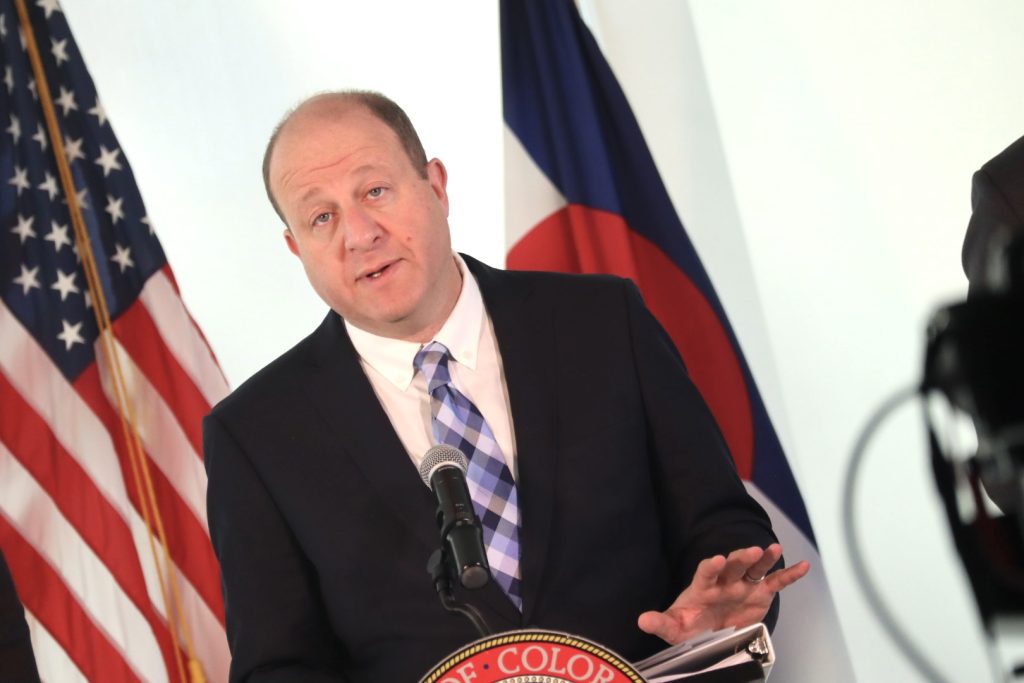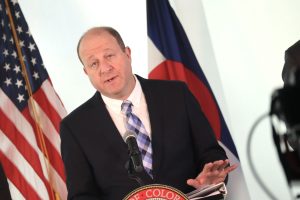Colorado governor warns Congress is running out of time to extend health care subsidies
Jared Polis is urging Colorado’s federal delegation to act before Sept. 30 to avoid ‘massive premium increases’ next year

Robert Tann/The Post Independent
Colorado Gov. Jared Polis is calling on the state’s federal delegation in Congress to act fast and pass an extension of Biden-era health care subsidies before the end of the month.
Polis, in a Sept. 9 letter addressing all eight of Colorado’s lawmakers in the U.S. House and its two U.S. Senators, said a failure to extend the subsidies by the end of September will “double or triple health insurance costs for hundreds of thousands of Coloradans” next year. The letter was also signed by Lt. Gov. Dianne Primavera.
Originally passed in 2021 by congressional Democrats and former President Joe Biden as part of a sprawling COVID-19 relief package, the subsidies, called the enhanced premium tax credit, lowered health insurance premiums on the individual marketplace, which serves people who don’t get insurance through their employer. In Colorado, the marketplace is called Connect for Health Colorado.
The enhanced tax credits were later renewed through Biden’s 2022 climate and health care law, and were credited with driving record individual marketplace enrollment across the country. The subsidies are now set to expire at the end of this year.
If that happens, insurers on Connect for Health Colorado are expected to raise average premiums in 2026 by 28% statewide, and 38% on the Western Slope.
But the true costs for many Coloradans could be far greater. That’s because the enhanced tax credit’s expiration won’t only shrink benefits for lower-income people but will also eliminate benefits for those making over 400% of the federal poverty line.
In Colorado, that equates to $62,600 a year for an individual and $128,600 for a family of four. Without any subsidy, a family of four that makes that much on the Western Slope, for example, could be paying over $25,000 more for insurance next year, according to an analysis by the Colorado Division of Insurance.
Polis said rural Coloradans on the Western Slope and Eastern Plains “will be hit the hardest, as will hospitals and other health care providers that already operate on the margins.” Increases for some people in rural counties could reach over 300%, Polis stated in his letter.
Polis said state lawmakers have already taken action to mitigate the fallout by passing legislation during their August special session, which he quickly signed.
The measure, House Bill 6, raises additional corporate tax revenue to pump $100 million into state programs meant to reduce the cost of health insurance. Yet even with that legislation, Polis said more than 75,000 Coloradans could still be at risk of losing insurance next year due to the expiration of the federal subsidies.
“Only Congress can stop these massive premium increases and the resulting loss of coverage,” Polis said.
The issue has become a major obstacle in Congress as lawmakers race to pass annual funding bills to avoid a government shutdown before Sept. 30.
Top Democrats have said they’ll reject Republicans’ funding proposals if they do not include an extension of the premium subsidies, an issue that has divided the GOP.
The Daily Report: All the Garfield County News
Breaking news, local headlines, community stories — delivered straight to your inbox.
12,000+ readers stay ahead. Subscribe at PostIndependent.com/newsletter
Some Republicans support an extension, while others have signaled they’re open to the idea but want to see a plan from Democrats that avoids tying it to the shutdown fight. Some in the GOP remain wholly opposed to continuing the subsidies.
Republicans control Congress, with a 219-212 majority in the House and a 53-47 majority in the Senate.
Rep. Jeff Hurd, who represents much of western and southern Colorado, is among a handful of House Republicans who’ve introduced legislation that would keep the subsidies in place for another year. The measure, dubbed the Bipartisan Premium Tax Credit Expansion Act, also has support from some Democrats.
Hurd, in a recent interview, said he was confident that support for an extension would grow in Congress once the “reality of double-digit premium increases hits home.” He’s hoping a one-year extension can buy time for lawmakers to work out a more permanent solution.
“I think we can get it done,” Hurd said. “How this exactly will work remains to be seen, but I’m certainly committed to being someone that, on the Republican side, is committed to finding a solution.”
Adam Fox, deputy director for the Colorado Consumer Health Initiative, said if an extension of the enhanced tax credits is not passed by Sept. 30, it’s unlikely health insurers will have enough time to adjust their rates for next year.
Open enrollment begins on Nov. 1, and insurers must go through the approval process with the state’s insurance division and upload their plans well before then. Coloradans are expected to receive notices for their new rates sometime in October, according to Fox.
“Congress really needs to understand that in order for this to be effective and in place, they have essentially two weeks to get it done,” Fox said. “That said, an extension of the tax credits is important no matter how it happens or when it happens. But if Congress is really focused on trying to prevent the massive premium spikes and chaos in our insurance market, they have to act now.”
Fox said his group would also prefer to see a long-term or even permanent extension of the enhanced tax credits, adding that a one-year fix will put Coloradans “back in the same situation next year with catastrophic rate increases.”
Any extension of the enhanced tax credits is likely to cost billions of dollars. Biden’s 2022 climate and health law contained $64 billion in new spending to extend the subsidies through 2025.
It’s unclear how many lawmakers would support a one-year extension. Hurd is currently the only Colorado lawmaker who has signed onto the bill extending the subsidies for an additional year.
Rep. Joe Neguse, who represents central and northern mountain communities that neighbor Hurd’s district, co-sponsored legislation in January to extend the enhanced tax credits permanently. More than 130 Democrats have since signed onto that measure.
In a statement shared through a spokesperson, Neguse said: “My Democratic colleagues and I have made clear that we are committed to lowering health care costs across the board, and I’ve long been a champion for extending these tax credits permanently. Our colleagues across the aisle must join us and follow suit.”

Support Local Journalism

Support Local Journalism
Readers around Glenwood Springs and Garfield County make the Post Independent’s work possible. Your financial contribution supports our efforts to deliver quality, locally relevant journalism.
Now more than ever, your support is critical to help us keep our community informed about the evolving coronavirus pandemic and the impact it is having locally. Every contribution, however large or small, will make a difference.
Each donation will be used exclusively for the development and creation of increased news coverage.










